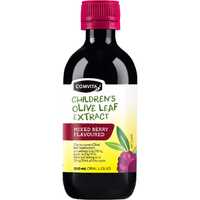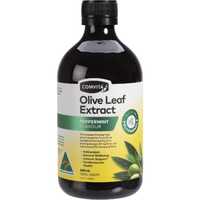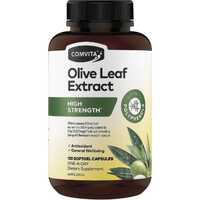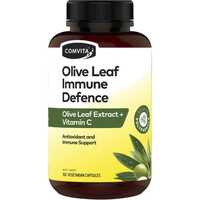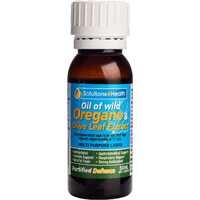Olive leaf extract, derived from the leaves of the olive tree, has been gaining attention for its potential health benefits [1]. This natural supplement is rich in oleuropein, a beneficial compound also found in olive oil [1]. Research suggests that olive leaf extract may help with various health conditions and topics, including weight loss, heart health, type 2 diabetes, brain health, blood pressure, cancer risk reduction, herpes treatment, food freedom, nutrition, sustainability, gut health, mood foods, sleep, skin care, sexual health, women's health, mental well-being, and men's health [2].
In this article, we will delve into the world of olive leaf extract, exploring its key components, potential health benefits, and recommended dosages. We will also discuss the potential side effects and considerations to keep in mind when incorporating olive leaf extract into your wellness routine.
What is Olive Leaf Extract?
Olive leaf extract is derived from the leaves of the olive plant (Olea europaea) and contains an active ingredient called oleuropein [2]. It has been used in traditional medicine for centuries, particularly in countries like Greece, Morocco, and Tunisia [2]. The concentration of beneficial compounds in olive leaves depends on several factors, including the origin, olive tree cultivars, climatic conditions, harvesting season, and agricultural practices [5].
Key Components and Benefits
Polyphenols
- Antioxidants that support the immune system by fighting cell damage that causes disease [4].
- May play a role in preventing conditions like cognitive decline, cancer, and osteoporosis [4].
Oleuropein
- A unique polyphenol with anti-inflammatory, antiviral, and antimicrobial effects [4].
- Contributes to the anti-inflammatory and antioxidant properties of olive leaf extract [2].
Triterpenic acids
- Oleanolic acid is the main triterpene in olive leaves [5]]
Olive leaf extract is available in various forms, including:
- Capsules
- Soft gels
- Powders
- Tinctures [3]
Health Benefits of Olive Leaf Extract
Olive leaf extract has been shown to have various health benefits, including managing type 2 diabetes, supporting heart health, and protecting against viral infections [3]. The active compound in olive leaf extract, oleuropein, has antioxidant and anti-inflammatory properties [3]. It improves cardiovascular health, lowers blood sugar, reduces insulin resistance, and strengthens the immune system [4]. Olive leaf extract may help protect against cognitive decline, cancer, and osteoporosis [4].
Cardiovascular and Metabolic Health Benefits
- Lowers blood pressure and improves cholesterol levels [1] [6]
- Reduces the risk of developing type 2 diabetes and improves insulin sensitivity [6] [8]
- Supports cardiovascular health, helping to reduce the risk of cardiovascular disease, including stroke and heart attacks [8]
- Protects against LDL (bad) cholesterol oxidation and decreases lipid peroxidation in humans [9]
Neuroprotective and Anti-Cancer Properties
Neuroprotection
- Protects against dopaminergic neuron loss associated with Parkinson's disease [9].
- Counteracts amyloid plaque generation and deposition in Alzheimer's disease [9]
Anti-cancer effects
- Inhibits the expression of VEGF, MMP-2, MMP-9, and MMP-13 through a reduction in COX-2 levels [9]
- and may help reduce the risk of or fight cancer [1][7]
Olive leaf extract's antioxidant and anti-inflammatory properties contribute to its potential in preventing and treating various chronic diseases [4]. Its primary active compound, oleuropein, has been shown to reduce the expression of pro-inflammatory cytokines and enzymes [9], making it a promising natural supplement for promoting overall health and well-being.
Potential for Weight Management
Olive leaf extract has shown promise in supporting weight management and reducing the risk of obesity. Early studies indicate that oleuropein, a key compound in olive leaf extract, may prevent unwanted weight gain and aid in reducing food intake [2] [6]. In a study conducted on rats with obesity, those given oleuropein exhibited lower body weight and reduced fat tissue compared to the control group [6].
The potential weight management benefits of olive leaf extract can be attributed to its ability to:
- Prevent high-fat, diet-induced obesity [2]
- Manage appetite and overeating [6]
- Reduce the risk of obesity [4] [6]
Prevents unwanted weight gain
- Oleuropein in olive leaf extract helps prevent unwanted weight gain [6]
Reduces risk of obesity
By incorporating olive leaf extract into a balanced diet and healthy lifestyle, individuals may be able to better manage their weight and reduce the risk of obesity-related health issues [2] [4] [6].
Key Bioactive Components
Olive leaves contain a variety of bioactive compounds that contribute to their health benefits, including secoiridoids, hydroxytyrosol, polyphenols, triterpenes, and flavonoids [10]. The main polyphenolic compounds in olive leaves are secoiridoids, flavonoids, and simple phenols [11]. Oleuropein, a secoiridoid, is one of the most significant bioactive components found in olive leaves [11] [12].
Oleuropein
Hydroxytyrosol
- A phenolic compound with antioxidant properties [10].
Polyphenols
- High content in olive leaf extract, utilized in traditional medicine for multiple health advantages [10].
Triterpenes
- Present in olive leaves, contributing to their bioactive profile [10]
Flavonoids
- One of the main polyphenolic compounds in olive leaves [11].
The nutritional analysis of olive leaves has revealed:
- Predominance of total carbohydrates, followed by moisture, total protein, ash, and total fat [14]
- Higher total protein content in leaf sprouts, with Cobrançosa cultivar having the highest at 11.66 ± 0.01 [14]
- Higher total fat content in elementary leaves, except for Madural's cultivar [14]
- Higher total phenolic content (TPC) in Cobrançosa's leaves and leaf sprouts compared to other varieties [14]
The vitamin E profile of olive leaves showed α-tocopherol (α-T) as the major isomer, followed by γ-tocopherol (γ-T), β-tocopherol (β-T), and δ-tocopherol (δ-T) [14]. The fatty acid (FA) profile identified a relative major presence of PUFA > SFA > MUFA for all cultivars, except for Cobrançosa's leaf sprouts, which had SFA > PUFA > MUFA content [14].
Potential Side Effects and Considerations
While olive leaf extract is generally considered safe for most people, there are some potential side effects and precautions to keep in mind. Some studies have reported side effects such as coughing, vertigo, stomach pains, and headaches [4]. People who are allergic to the pollen produced by olive trees or other plants in the Oleaceae family, such as ash trees, forsythia, jasmine, lilacs, and rivets, may have an allergic reaction when taking olive leaf extract [3] [4].
Interactions with Medications and Medical Conditions
Olive leaf extract may interact with certain medications, including:
If you have diabetes, kidney disease, or are taking medications to manage your blood sugar or blood pressure, consult your doctor before taking olive leaf extract [1] [3] [4]. Olive leaf extract may lower your blood pressure and blood sugar levels, potentially enhancing the effects of these medications [4] [13].
Precautions for Specific Populations
Pregnant women
Breastfeeding women
People with hepatic disease
- Caution may be warranted [13]
The long-term use of olive leaf extract has not been extensively studied, so it is essential to consult a healthcare provider for proper dosage and duration [3]. Possible side effects may include muscle discomfort, headache, upset stomach, diarrhea, acid reflux, heartburn, and dizziness [1] [3] [6] [7]. If you experience severe or concerning side effects, stop taking the extract and speak to your doctor [6].
Recommended Dosages
While there are no official dosing recommendations for olive leaf extract, studies indicate that its health-boosting effects occur when taking 500 to 1,000 milligrams daily [4]. The recommended daily dosage is typically between 500 to 1,000 milligrams, which can be divided into multiple doses throughout the day [2] [4]. It is essential to follow your doctor's recommendation and the manufacturer's guidelines to ensure you take a safe but effective amount [4].
Capsules
- 500-1,000 milligrams daily
Tea
- Steep one tablespoon of dried olive leaves in hot water for 10 minutes and drink a cup (or more) a day
Human studies have used the following dosages:
- 500-1,000 mg per day of a standard olive leaf extract, usually in divided doses [6]
- 500 mg twice daily for 8 weeks in patients with stage 1 hypertension [13]
- 51.1 mg oleuropein and 9.7 mg hydroxytyrosol daily for 12 weeks to examine insulin action and cardiovascular risk factors [13]
Always follow the specific directions provided with the chosen brand of olive leaf extract, as strength and dosages may vary [2]. Many commercial olive leaf extract preparations of varying strengths are available [13]. If you have any concerns or questions about the appropriate dosage for your individual needs, consult with a healthcare professional.
Conclusion
Olive leaf extract has emerged as a natural supplement with numerous potential health benefits, including supporting cardiovascular health, managing blood sugar levels, and promoting weight management. Its key bioactive components, such as oleuropein, hydroxytyrosol, and polyphenols, contribute to its antioxidant and anti-inflammatory properties. By incorporating olive leaf extract into a balanced diet and healthy lifestyle, individuals may be able to harness its potential to improve overall well-being.
However, it is crucial to be aware of the possible side effects and interactions with medications or medical conditions before starting to use olive leaf extract. As with any dietary supplement, it is always advisable to consult with a healthcare professional to determine the appropriate dosage and to ensure it is safe for your individual needs. With proper guidance and mindful usage, olive leaf extract may serve as a valuable addition to your wellness routine.
FAQs
1. How quickly can I expect to see results from using olive leaf extract?
The effectiveness of olive leaf extract can vary depending on your specific health objectives. Generally, studies suggest that noticeable results can be achieved within 8 weeks of consistent use.
2. Is daily consumption of olive leaf extract safe?
While there is no universally recommended dosage for olive leaf extract, consuming between 500 to 1,000 milligrams daily has been shown to be beneficial. However, it's important to consult with your healthcare provider and adhere to the guidelines provided by the product's manufacturer to ensure both safety and efficacy.
3. What are some effective methods for taking olive leaf extract?
Olive leaf extract can be incorporated into your routine in several ways:
- Tea: Brewing a tea from fresh olive leaves is preferred, though dry leaves can also be used.
- Food Addition: The powdered form of olive leaf can be added to various foods, from smoothies to pancakes.
- Capsules: For ease and convenience, olive leaf extract is also available in capsule form.
4. Can olive leaf extract help in reducing arterial plaque?
Yes, olive leaf extract contains polyphenol compounds that have been shown to prevent the formation of arterial plaques. This is primarily due to its anti-inflammatory effects, which combat the inflammation caused by oxidized LDL, a major contributor to arterial damage. This can help reduce the risk of heart attacks and strokes.
References
[1] - https://www.realsimple.com/health/preventative-health/olive-leaf-extract-benefits
[2] - https://www.healthline.com/health/olive-leaf-extract
[3] - https://www.verywellhealth.com/the-benefits-of-olive-leaf-extract-89489
[4] - https://www.webmd.com/diet/health-benefits-olive-leaf-extract
[5] - https://www.ncbi.nlm.nih.gov/pmc/articles/PMC9914354/
[6] - https://www.medicalnewstoday.com/articles/324878
[7] - https://olivewellnessinstitute.org/olive-leaf/olive-leaf-extract/
[8] - https://www.comvita.co.nz/blog/WHY%20136MG%20DAILY%20DOSE
[9] - https://www.ncbi.nlm.nih.gov/pmc/articles/PMC4227229/
[10] - https://www.ncbi.nlm.nih.gov/pmc/articles/PMC9678927/
[11] - https://www.mdpi.com/2227-9717/8/9/1177
[12] - https://www.mdpi.com/2304-8158/10/6/1236
[13] - https://www.drugs.com/npp/olive-leaf.html
[14] - https://www.ncbi.nlm.nih.gov/pmc/articles/PMC9921517/
[15] - https://draxe.com/nutrition/olive-leaf-benefits/


 Certified Organic
Certified Organic Vegan Friendly
Vegan Friendly  Vegetarian
Vegetarian Organic Ingredients
Organic Ingredients Dairy Free
Dairy Free Gluten Free
Gluten Free Keto Friendly
Keto Friendly


























